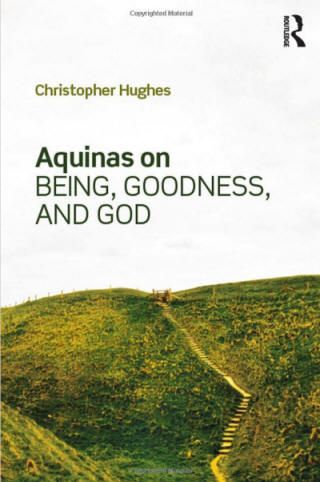Book Review
Aquinas On Being, Goodness, And God
Christopher Hughes
Routledge
ISBN 978-0-415-34644-3
 Christopher
Hughes examines the philosophy of Aquinas from the analytical tradition.
It begins with an overview of his life, his metaphysics and his account of
essence and existence. The last chapters details Aquinas's arguments for
the existence of God and his treatment of the problem of evil.
Christopher
Hughes examines the philosophy of Aquinas from the analytical tradition.
It begins with an overview of his life, his metaphysics and his account of
essence and existence. The last chapters details Aquinas's arguments for
the existence of God and his treatment of the problem of evil.
For the purposes of this review, I will look at the chapter on goodness. For Aquinas, we act always in order to be happy. Thus if we make evil choices, it is still out of our mistaken notion that we are pursuing our happiness. Hughes responds: "Couldn't I simply hate myself? Might I not be so consumed by self-hatred that I simply wanted not to be happy, and accordingly did nothing to pursue my own happiness?"
He goes on to give the example of a man who shoots his wife and then himself. If he is doing this because he wants to be happy, it appears to be a very twisted form of happiness.
But surely by giving such an extreme example, Hughes has drifted into the field of abnormal psychology? Men who have a twisted understanding of beatitude are unlikely to follow the ways of an authentic beatitude. Hughes notes that this was also taught by Aquinas. All we can say from this is that people desire beatitude although particular people have a very mistaken notion of what this is.
Hughes also notes that for Aquinas the pursuit of true happiness requires wisdom. Only the wise will attain happiness because the unwise think that happiness consists in pursuing wealth, honour and other distractions.
Happiness for Aquinas is not the alignment of the world with my desires.An unwise man's desires are defective. How does this tie in with Aquinas's belief that a rational beings's perfect good is whatever satisfies that being's will? Because for Aquinas only those whose desires are rooted in truth and goodness can be perfectly satisfied.
Although not an easy read at times for the non-specialist, this book is yet another reminder of why we need Aquinas more than ever. This in spite of the fact that Hughes sometimes disagrees with him.
REVIEWED BY DR PRAVIN THEVATHASAN
